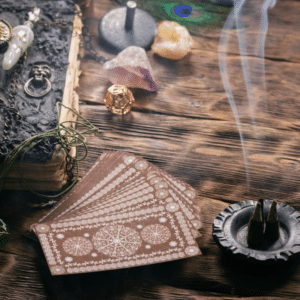
What is a Dream?
A dream is a sensory experience generated by your subconscious mind while your physical body is asleep. Dreams can be realistic reflections of one’s real-life environment, or they can be complete fantasies.
Everyone has dreams, approximately 4-6 each night—though you may not always remember them when you awaken.
Everyone dreams differently. Here are some of the different ways you can experience your dreams:
- In color vs. in black and white
- With sound vs. total silence
- In first person vs. watching yourself participate in the action
- Multiple times (recurring dreams) vs. having a dream only once
- Having enjoyable dreams vs. having more frightening dreams
While we may never know for certain the exact significance of our dreams, the subconscious mind and the soul often leave messages for you in your dreams. Some of these messages are subtle and easy to miss, while others are clear and easy to understand. Enter the art of dream interpretation, a practice you can use to tap into and strengthen your intuition.
What is Dream Interpretation?
Dream Interpretation is examining the content of a dream and assigning meaning to it.
People of all cultures and religions have been interested in dream interpretation for centuries. The Egyptians created the first Dream Dictionary about 4,000 years ago. Carl Jung and Sigmund Freud are famous psychologists who studied and formulated theories about dreams. Today, many cultures still practice dream interpretation regularly.
Practically, dream interpretation work can help us rediscover the repressed memories and recognize the unresolved fears that live in the subconscious, so we do not have to be controlled by them in our waking lives. Dream interpretation is meant to strengthen your connection with your intuition and how you can communicate with your soul. Dreams open the door to an enormous reservoir of information about ourselves and the world around us that we cannot access in our waking lives.
Dream interpretation work also impacts the physical body. Because the brain can’t determine the difference between a dream and a real experience while we sleep, the body will release stress hormones and experience emotions due to certain dreams or nightmares. Humans need adequate sleep to survive,` and our quality of sleep can impact our mental health. The art of dream interpretation can help you work through some of the areas of your life that may be causing your dreams.
How Does Dream Interpretation Work?
Dream interpretation can often be done by isolating specific elements or dream symbols. Because we all share streams of consciousness, certain symbols and archetypes often appear in our dreams and have common meanings. For example:
- The weather can represent our emotions
- Houses or cars often represent our bodies and
- The people in our dreams represent a part of ourselves
Other common dream symbols include:
- Your childhood home
- Going to school
- Death or dying
- Babies
- Traveling
- Animals
- Car accidents
You can look up the common meanings of the people, places, animals, and things that show up in your dreams in our Dream Dictionary and find the meaning that resonates with you.
While there are certain symbols with common meanings that dream interpreters have identified over the years, you’re going to be your own best dream interpreter because you’re the expert on you!

How Can You Remember Your Dreams?
Remembering your dreams is the first step in dream interpretation. Most people forget the vast majority of their dreams.
The good news is that as you realize the importance of dreams and become more interested in them, you’re more likely to remember your dreams! So, find an old notebook and start a dream journal.
Keeping a dream journal beside your bed where you can write down what you remember of your dreams as soon as you’ve woken up means you’ll be able to identify larger patterns. As we mentioned before, intention-setting is a powerful tool in dream interpretation. Before you go to sleep, tell yourself you’ll remember your dreams tonight.
And, take care of yourself. Exercising, eating healthy, and eliminating drugs and alcohol can help you remember dreams better. Healthy body, healthy mind.
There are five stages of sleep. Proper dreams begin in the 4th stage, but most dreaming happens during the 5th stage of sleep: REM or Rapid Eye Movement Sleep. If you’re awakened during the REM stage, you will likely remember that you were dreaming. This is because your brain is completely active during the REM Sleep stage.
Start Exploring the Dream Dictionary
Now that you know a little bit more about dream interpretation, you have your dream journal, and you’ve intended to remember your dreams, the next step is to start exploring our Dream Dictionary. It contains potential explanations for many common dreams.
Remember that these are just possible explanations. Think of them as a starting point to help you start understanding and interpreting your own dreams. After all, you know yourself and your life best!
What Types of Dreams Are There?
Unless it’s a recurring dream, all dreams are different. Modern dream researchers have isolated the types of dreams people often experience. This is by no means an exhaustive list; one dream can often fall into more than one type.
Childhood Dreams
If you find yourself transported back into your childhood in your dreams, an experience you had in the past is likely affecting your current life.
False Awakening
If you “wake up” in a dream or feel that you are no longer asleep, you’re experiencing a false awakening dream.
Lucid Dreams
A lucid dream is a dream in which you’re aware you’re dreaming. Some people find that, with time and practice, they can direct their dreams at their will. That means good dreams can get better, and nightmares don’t have to be nightmares at all.
Dream interpretation work can increase your chance of lucid dreaming because it increases your awareness. Meditation is also a helpful tool in the practice of lucid dreaming because it can activate your Third Eye chakra. Lucid dreaming gives you control over your dreams, and yes, anyone can learn to do it.
Nightmares or Night Terrors
We believe there are no bad dreams because the more intense they are, the more important the lesson. Even the most terrifying, dramatic dream may hold a healing message for you. Most of our dreams have to do with the thoughts we allow into our minds during the day.
Training your mind with affirmations and meditation can help reduce nightmares, but facing your fears so you can move forward will resolve these bad dreams best.
Out-Of-Body Dreams
It’s common to watch yourself in your dreams as if you are watching yourself in a movie. It’s also possible to inhabit a body that isn’t yours and watch “yourself” as a new person. When sleeping, your point of view isn’t limited to what you can see through your own eyes as it is in your waking life. If you have out-of-body dreams that bother you, practice intentionally looking at yourself in a mirror before you fall asleep.
Past-Life Dreams
In these dreams, you recognize yourself from a past life. If you feel you’ve visited a past life in a dream, consider how that life may affect your current life.
Physiological Dreams
In physiological dreams, you have sensory experiences wherein you “feel” physical sensations like pain, smells, textures, tastes, or temperatures in your dreams.
Precognitive Dreams
A precognition refers to a dream that reveals information about future events. That said, a very small percentage of dreams are actual predictions of the future. Remember that the future is not written in stone. When you see something in a dream that happens in your waking life, think of it as a nice reminder that your spirit is real and you’re intuitively connected to the Universe.
Recurring Dreams
If you have had the same dream more than once, you’ve had a recurring dream. In dream interpretation, recurring dreams are believed to contain the strongest and most useful healing messages. They happen to protect us, and they do not go away until we get the message. Once you have done the work in your waking life to resolve the fear, anxiety, or problem the dream is pointing you towards, the recurring dream will usually cease.
Sexual Dreams
Dreams that contain sexual themes can be confusing and stressful upon waking, but they often reveal that we are either suppressing our desires in general or that we are in the midst of manifesting something. Sex dreams are not usually meant to be taken literally, so don’t get stuck on them.




